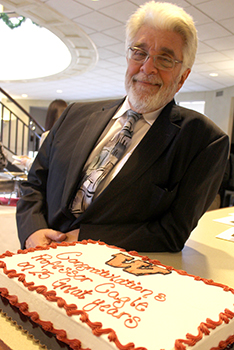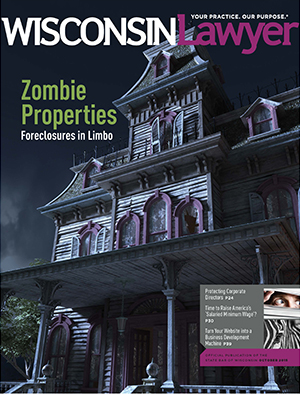A Living Example of Ralph Cagle’s Influence as a Legal Educator
 As one of the many hundreds of fortunate, former U.W. law students taught and inspired by Ralph Cagle, I was delighted to see recognition of Ralph’s retirement from teaching after 25 years of dedicated service (“Ending an Era in a Lawyer’s Life,” Wisconsin Lawyer, January 2016). It is impossible to overstate the full value and significance of Ralph’s enduring lessons and cheerful career encouragement as both teacher and mentor for a generation of successful and happy lawyers.
As one of the many hundreds of fortunate, former U.W. law students taught and inspired by Ralph Cagle, I was delighted to see recognition of Ralph’s retirement from teaching after 25 years of dedicated service (“Ending an Era in a Lawyer’s Life,” Wisconsin Lawyer, January 2016). It is impossible to overstate the full value and significance of Ralph’s enduring lessons and cheerful career encouragement as both teacher and mentor for a generation of successful and happy lawyers.
A living example of Ralph’s influence became evident during jury selection in a recent criminal trial that took place in my Dane County courtroom just a few weeks ago. I was surprised but very glad to see Ralph among the prospective group of jurors called to the box for voir dire. Early in the process, as part of the introduction of the parties, I always ask jurors if any of them know the attorneys or if they have had contact with them in the past. My practice is to start with the prosecutor then turn to defense counsel.
When asked to explain why he raised his hand, Ralph told us that the prosecutor was a former student of his but that this would not interfere with his ability to be fair to both sides. Before he could say more, I volunteered that I also was a former student of Ralph’s. Several other jurors started to chuckle out loud about this coincidence while he assured us that our past contact would not interfere with his duties as a juror. When defense counsel politely spoke up at this point and stated that she also had been a student of Ralph’s, we all laughed openly.
We Want to Hear from You! Submit a Letter to the Editor
Wisconsin Lawyer provides a forum for members to express ideas, concerns, and opinions on law-related subjects. Send comments to wislawyer@wisbar.org (include “Letters” in the subject line), or mail to Wisconsin Lawyer “Letters,” P.O. Box 7158, Madison, WI 53707-7158. Limit to 500 words. Writing guidelines available.
As we came back to order, Ralph again promised that although he knew defense counsel and had also taught her in the past, he could still be fair to both sides. So even though he had been a law professor for the prosecutor, the defense attorney, and even the judge, I ultimately ruled that Ralph was qualified to serve as a juror as long as he promised not to issue grades for our respective performances throughout the trial.
(Alas, in the end, one of his former student attorneys exercised a peremptory strike and he was not a juror for the trial. I’m pretty sure Ralph was sincerely disappointed. Maybe next time, Professor.)
Congratulations on a magnificent career in legal education, Ralph, and thank you for helping us become better lawyers and, more importantly, better people in general.
Judge Nicholas J. McNamara
Dane County Circuit Court, Madison
Connecting with the Meaning of the Work Promotes Job Satisfaction
 I just read Paula Davis-Laack’s article on making work more meaningful (“5 Strategies to Make Your Work More Meaningful,” Wisconsin Lawyer, December 2015). I want to pass along my compliments and thank her for putting a concept that I’ve turned around in my mind for several years into such clear words.
I just read Paula Davis-Laack’s article on making work more meaningful (“5 Strategies to Make Your Work More Meaningful,” Wisconsin Lawyer, December 2015). I want to pass along my compliments and thank her for putting a concept that I’ve turned around in my mind for several years into such clear words.
My legal career has involved two different positions – associate in transactional/compliance practice at a large firm, and now producing employment and benefits legal content for a software company. In both cases, there has been a lot of separation from the end user (a term we use here as well), and finding that meaning has been at times impossible and at others just a challenge. I have found the most success and job satisfaction when I’ve been able to connect with the meaning of the work, and your article confirmed the importance of doing so and even better, provided really usable strategies for doing it.
I manage a team of attorneys now, and they could do their jobs just fine with no end user connection at all. But your article was a good reminder of how important it is for me, as their manager, to help them make the connection. I’m going to share your article with them and incorporate some of your strategies into my management goals for the year.
Also, in a coincidence of timing, my company is hosting David Mead, from Simon Snek’s team, at a town hall meeting later in January, so that definitely caught my eye.
Erica Storm
Director, Legal Content
Home was Model for ‘Psycho’ House
 Albeit a caricature, I enjoyed seeing a picture of the home that I lived in for 20 years on the cover of your October 2015 edition. Very reliable hearsay establishes the home as the model used for the house on the hill behind the Bates Motel in Alfred Hitchcock’s 1960 movie “Psycho.”
Albeit a caricature, I enjoyed seeing a picture of the home that I lived in for 20 years on the cover of your October 2015 edition. Very reliable hearsay establishes the home as the model used for the house on the hill behind the Bates Motel in Alfred Hitchcock’s 1960 movie “Psycho.”
Robert Bloch was an author, who lived in Weyauwega, Wis., and wrote a thriller in 1959 that was loosely based on Ed Gein, the psychopathic killer from nearby Plainfield. The home was built around 1875 and still exists on South Main Street in Waupaca. The author’s proximity to both Waupaca and Plainfield was the reason the house was used as the model. Even today the resemblance is uncanny.
The serendipity of seeing my old home on the cover of the Wisconsin Lawyer was a wonderful unexpected benefit of bar membership.
Judge Philip M. Kirk
Waupaca County Circuit Court, Waupaca
Maintain Civility: Don’t Take the Bait!
The best career advice I was given was “don’t take the bait.” I received this advice from a mentor regarding the best way to deal with difficult attorneys. It is simple advice, but important to every attorney and, in fact, to every judge.
The practice of law in the courtroom often involves conflict. Many attorneys, young attorneys in particular, don’t consciously choose to start the conflict, but rather allow themselves to get drawn into it for fear of looking bad in front of their client. As a result, they are less effective in advocating for their client and lose focus on their goals.
Similarly, judges can get drawn into the conflicts of the attorneys appearing in front of them. As the emotions of the attorneys rise, it gets deflected onto the court. Often, fearing the loss of control in their courtroom, judges wade into the fray and lose control of their own emotions.
Learning to figure out when to express anger at appropriate times versus when it is being pulled out by someone else is a skill that every attorney should master and one that can be furthered. It is a skill that improves advocacy and decision-making and, hence, a career.
Judge Thomas J. Walsh
Brown County Circuit Court, Green Bay
Here’s What You May Have Missed
Best to Serve Departing Lawyer’s Clients
In “Breaking Up Is Hard: Lawyers on the Move” (InsideTrack, Jan. 6, 2016), David Leibowitz says it’s not good form – or even good for your reputation – to just give your two weeks’ notice and leave. Instead, departing your firm or position takes preparation. Do it properly, he says, because your reputation is at stake, especially in a small-population state like Wisconsin. A reader has another reason to do it properly.
Response: “A departing lawyer and the lawyer’s firm have an ethical duty to notify the lawyer’s clients of his or her departure.” And, if the departing lawyer will continue to practice, the departing lawyer and the firm have an ethical duty to notify clients that the clients have a choice regarding whether to proceed with the departing lawyer or the firm as their counsel.
While Mr. Leibowitz properly notes that not being a jerk will not be good for the departing lawyer’s career, a more important reason for not leaving unfinished business is because that best serves the departing lawyer’s clients.
Daniel Freund
Freund Law Office, Eau Claire
Watering Down Fifth Amendment Protections is Dangerous
 In “No Miranda Warning but Appeals Court Upholds Use of Incriminating Statements” (WisBar.org, Jan. 19, 2016), author Joe Forward reviewed the District II Court of Appeals’ decision in State v. Harris, 2014AP1767-CR (Dec. 30, 2015).
In “No Miranda Warning but Appeals Court Upholds Use of Incriminating Statements” (WisBar.org, Jan. 19, 2016), author Joe Forward reviewed the District II Court of Appeals’ decision in State v. Harris, 2014AP1767-CR (Dec. 30, 2015).
Brian Harris argued it was a violation of his Fifth Amendment right against self-incrimination to allow statements he made to police to be used at trial, even though he made the statements without receiving any Miranda warnings. The appeals court disagreed, concluding that statements “were sufficiently attenuated from the officer’s questioning so as to purge any potential taint. …” That struck a reader’s nerve.
Response: Why wasn’t he given Miranda rights? He clearly was in custody. Why were the statements needed? The evidence against him appears to have been strong. And, based on the summary, this appears to be a silly case to use to compromise the U.S. Constitution. We are talking about a guy who broke into a house to steal copper piping to sell to get food. However, no matter what the case, watering down the Fifth Amendment with terms like “sufficiently attenuated” and “reasonably likely” is a dangerous direction to go for both the state and the suspect.
Jeffrey Mayer
Mayer Lorenz Law Office LLC, Lodi
